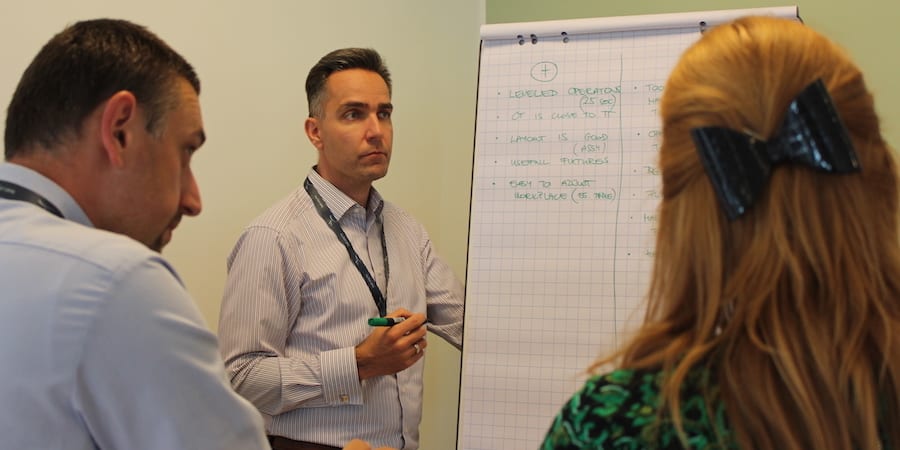
Hope in lean nation
FEATURE – As 2020 finally draws to an end, our editor reflects on the year that was and discusses why the Lean Community is a such an important source of inspiration and hope.
Words: Roberto Priolo, Managing Editor, Planet Lean
Uff. What a year. Covid-19 has turned our lives upside down, throwing whatever certainty we had coming into 2020 out of the window. Nothing like a pandemic to test our resolve and resilience and remind us of how insignificant and frail human beings are.
Watching events unfold has felt – I am sure many of you will agree – unreal. It’s been like suddenly living in a Hollywood blockbuster, like we kept repeating in the first few weeks of the pandemic. Too bad we can’t just walk out of the cinema or switch channels! There are many images and feelings that I know I am going to remember for as long as I live, from the empty streets of the city during lockdown to the constant sound of ambulances breaking the eerie silence, from the shops and restaurants with their shutters down (many of them forever) to the fear of infection, from the bombardment of figures and (mis)information on the news to air travel coming to a standstill. But I think that what will linger the longest for many of us is the sense of isolation and anxiety, side effects of the pandemic that we are still not talking about enough.
And yet, through all these worries, I had someone accompanying me, making this 2020 more bearable and bringing some light to an otherwise very dark time – the Lean Community. Whenever the situation began to feel overwhelming, I found great comfort in talking to people around the world working hard to make things better, often in the face of unbelievable difficulties. I may no longer be able to see them in person now that travel has become all but impossible, but I can still listen to their stories and share them with our readers. What a privilege this is for me!
And sure enough, soon after the pandemic began, Planet Lean ramped up its publishing schedule to three articles per week – the only way to accommodate the massive influx of articles coming to me from all corners of the world. Sharing those examples of resilience and improvement helped us to feel like we were doing our part, and I sure hope you found inspiration in them. I know I did! How incredible it was to hear from the Italian manufacturer that, thanks to Lean Thinking, was able to put in place a contingency plan in a matter of hours so to remain open in complete safety and continue to serve a critically important supply chain. How heart-warming to collaborate with my colleagues from the Lean Healthcare Initiative to create an article that brought together the experiences of hospitals around the world leveraging their lean knowledge to respond to the Covid-19 emergency. A few weeks later, a group of practitioners from the food industry did the same thing, hoping to inspire and help companies in one of the sectors that is worst affected by this crisis.
THE FLEXIBILITY TO ENDURE
Lean organizations have proved resilient and able to adjust to the abrupt changes caused by the coronavirus. This reminds us that, above all else, lean gives us the flexibility and adaptability we need to ensure business continuity. It allows us to solve problems, big and small, by leveraging the capabilities of our people and continuously learning. At a time when most governments and many traditional organizations are running around like headless chickens, there is something comforting in knowing that lean organizations have not given in to panic. Instead, they are using the crisis to further develop themselves, to learn, to find new and better ways of doing things.
With her series Notes from the (virtual) gemba, this year Catherine Chabiron shared a number of examples that demonstrate this unequivocally – from the hospital in Martinique that was able to stave off disaster by successfully anticipating the exponential increase in demand caused by Covid to the small manufacturer that even found a way to innovate in the midst of the crisis.
We have also had an opportunity to hear how Toyota is coping with this historical challenge. In a May press conference, Akio Toyoda gave us some much-needed perspective by reminding us that no year under his tenure has been crisis-free and that, when the storm hits, it’s important to avoid panicking and remain level-headed. In commenting on his insights, John Shook and Jeff Liker wrote: “There will always be a ‘next crisis’ – we just don’t know what it will be and when it will appear. It is by recognizing this that Akio emphasizes the importance of managing stably, without panic, even when novel approaches are called for and innovation is more necessary than ever. This connection between the yin and yang of stability and innovation is a vital source of Toyota’s enduring strength.” Read the full article here.
In 2020, we have been reminded time and again that when the going gets tough, lean thinkers give the best of themselves. The reason? They see crises as opportunities for growth and learning. Michael Ballé echoed this sentiment here, explaining why lean is more relevant than ever: “Lean Thinking wasn’t invented for when all goes well. It’s most useful precisely when all seems shot. As soon as their brains recover from panic-driven emotions, people are smart and mean well and they will find a way – particularly with a smart method to think things through. […] When we look back, crises are actually the moment when smart people figure things out and when you can learn precisely because you’re stimulated and focused […]. In the end, growth mindset is what pulls us through, both in good times – with continuous improvement – and in bad, with not making matters worse and figuring a path forward. Lean Thinking is the framework to support and scaffold a growth mindset attitude. We need it now.”
Ultimately, lean is about finding creative solutions to problems. In this interesting piece, Dave Brunt discusses how spaghetti charts and flow can inspire a new way of organizing the customer experience in retail outlets, while here José Ferro tells us why in times of crisis we should turn to daily management and experimentation. Another article from Brazil discussed how lean can help us make the most of remote working, which in 2020 has become the norm for millions of people around the world. And how can lean help when our order book dries up? (Something that many are experiencing this year.) René Aernoudts and Michael Ballé told us here.
With the announcement of a number of highly effective Covid-19 vaccines, we are now starting to see the light at the end of the tunnel. And we can proudly say that lean is contributing to the monumental task of distributing the vaccine to as many people as possible: just a few weeks ago, we heard from the Pall Corporation, which has been using lean product and process development principles to design the process that will be used to manufacture two billion doses of the Oxford-AstraZeneca Covid-19 vaccine over the course of 2021. Read all about it here.
BIGGER OUTCOMES
We tend to see lean improvement as limited to the transformation of one company, something that very rarely crosses the borders of the organization in the pursuit of more systemic change. But what if we dreamed bigger? Personally, I believe Lean Thinking has a greater role to play in identifying solutions to societal problems, issues that until now our community has perhaps hesitated to address. Being a data-driven bunch who believes in scientific thinking, imagining the future might not be our first instinct, but I think there is a lot of value in starting to propose solutions to large-scale issues – even if that requires a little bit of a stretch in our thinking. Dan Jones, co-founder of the Lean Movement, seems to agree with the idea of using lean to change the world: in this fundamental piece, he tells us how Lean Thinking can represent an alternative to the exploitation-based economic system that we are used to.
With this in mind, on Planet Lean we have started to experiment with the coverage of topics that are seemingly outside of lean’s remit, like structural racism. One might think that lean has nothing to say about this, but how can a philosophy that is based on the idea of respect for people not have something to offer? Here’s a few ideas on how lean leadership can address this fundamental issue.
Another existential problem we humans are failing to fully recognize and tackle is, of course, the climate emergency. As Dan Jones told us, the GDP-growth-at-all-costs is no longer compatible with a world determined to fight the environmental crisis. Lean Thinking teaches us about the smart use of resources as the way to unlock progress, and that’s exactly what the world needs right now. A leaner planet is a greener planet. Here, John Hamalian suggests eight lean practices that can help us advance our fight against climate change. Michael Ballé and I also discussed this topic, here. I must admit, I am in awe of our movement, made of people who are committed to eliminating waste (literally, even) and making the world a better place.
LEAN = HOPE
At a time when we are all a bit further apart, when coming together is no longer as easy as it was, lean has been of great help for many of us. We might be separated by borders and quarantines, but we still speak the same language. Isn’t it extraordinary that two people who have never met (or who are forced to meet over a videocall) are perfectly capable of communicating and understanding each other, whether they live in a dusty town in Botswana or in a high-rise in New York City, whether they work in a restaurant in China or in a hospital in Brazil?
It is through this common language and the collaboration it enables that Lean Thinking provides us with a path to a better future. By believing in the principles of lean and working together to achieve better outcomes for all, we are giving ourselves the biggest present we could ever receive this year: the ability to hope.
I am not being naïve here. I know that hope alone might get us through the bad days but won’t help us to eradicate our problems. Couple it with a belief in scientific investigation and improvement, however, and suddenly the sky is the limit. We can afford to be hopeful because Lean Thinking has a way of making the impossible possible. Albert Einstein once said: “Learn from yesterday, live for today, hope for tomorrow. The important thing is not to stop questioning.” And if there is one thing we lean thinkers are good at is challenging the status quo, one question at a time.
Earlier this year, Sharon Visser wrote that perhaps we, as lean thinkers, were born for a time like this, and this is the message I want to end this reflection with. This is our time to show the world the way out of this crisis and on to a better tomorrow.
I would like to thank all of our readers for your continuous support of Planet Lean. It is a great honor for us to serve this community. With the hope that next year is better than this year, I wish you all a peaceful holiday season. We will be back at the beginning of January.
THE AUTHOR

Read more


GETTING TO KNOW US – For our second interview with LGN directors, we travel to Hungary to meet the President of our affiliate institute there. He tells us his country’s need for good workers and how lean can make the difference.


WOMACK’S YOKOTEN – The sharing economy came with a very “lean” promise – underutilized resources made available to those who need them for a reasonable fee – but not all that glitters is gold.



FEATURE – Lean encourages us to go to the gemba as much as we can, but what should we actually do when walking the workspace? It turns out it’s not so much about doing as it is about thinking.


INTERVIEW – The British Broadcasting Company (BBC) has been working with a lean-inspired improvement program that is gradually transforming the culture of the business – one creative idea at a time.

